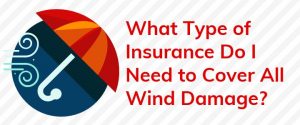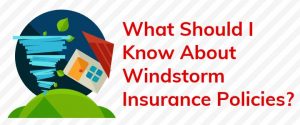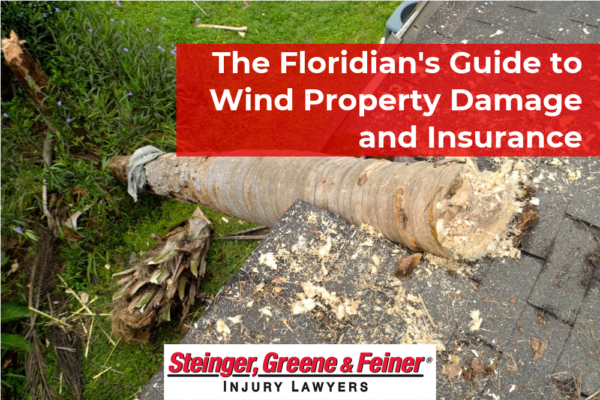FAST FACTS
- Florida accounts for 13% of nationwide insured catastrophe losses
- Florida was hit by 8 out the 10 costliest hurricanes
- Hurricane Andrew was #2, caused $25 billion in damages
Florida’s hurricanes are a well-known consequence for its balmy climate. Property owners in the state frequently have to contend with gale-force winds that rip shingles from roofs, topple trees, and generally wreak havoc on our sunny state.
In light of these frequent storms, Florida property owners must be aware of whether or not they have windstorm coverage and what the details of that policy are. While a typical homeowners insurance policy might cover moderate to severe wind damage to a property, extraordinary damages from major named storms often require a separate policy called windstorm insurance.
Windstorm insurance is wholly worth the investment for all property owners in Florida. According to the Insurance Information Institute (III), Florida damages occupied 13% of all insured catastrophe losses in the U.S. from 1987 to 2016. All told, Florida disasters accounted for $70.8 billion out of the total $364.3 billion national tab.
Because so much money is involved in these claims, even homeowners who do have windstorm insurance may be caught off guard by their policy rules or how the insurance company honors their claim. If you are struggling to get the money you feel you are owed by your policy after a major storm, you can work with a property damage lawyer in Miami to assist you with your claim and negotiate with insurers.
Property owners interested in protecting their precious assets and who want to make the right decisions when it comes to wind damage insurance in Florida can use the information below. These facts, along with the help of an experienced storm damage attorney, can help you greatly the next time a major storm bears down on the Sunshine State.

What Type of Insurance Do I Need to Cover All Wind Damage in Florida?
Insurance companies survive on their ability to predict losses and account for these losses in advance through charging premiums and securing underwriter investments. If too many variables stand in the way of their prediction ability, the insurance company risks profitability and insolvency.
In simpler terms: insurers care very much about their money, and they want to avoid situations where they pay out huge claims unexpectedly.
As such, a homeowners policy from a typical Florida insurance company will never include coverage for severe wind damage that happened during a major named storm. Eight of the 10 top costliest hurricanes in history made landfall in Florida. After storms like 1992’s Hurricane Andrew, which caused $25 billion in damages, insurers began to demand that property owners take out separate policies for named hurricanes that could have their own risk pool and actuarial calculations.
Florida residents have to buy a separate property insurance policy for catastrophic damages. For a time, such insurance was only available through specialized companies, including the partially state-run company Florida Citizen’s. Now, your homeowners insurance policy carrier can include windstorm coverage as an add-on.
Note that windstorm coverage only applies to damage for named storm events. Wind damage from minor storms, including tornadoes, cyclones, and sudden gusts, can usually apply to your normal homeowners insurance policy. You may also have coverage for damages from fallen trees and flying debris on your homeowners insurance policy so long as the incidents weren’t related to a major named storm event.

What Should I Know About Windstorm Insurance Policies?
Whether you own residential or commercial properties in Florida, you will want to take a moment to review your insurance policy terms for both basic property insurance and windstorm-specific coverage.
One of the biggest things you should look out for is your deductible. Some windstorm insurance policies peg your deductible as a percentage of your home’s total insured value. This deductible can be 2%, 5%, or as much as 10% of that value.
For a home insured at $450,000, a 5% deductible equals $22,500. Since many people don’t have a disaster savings fund set aside for that much out-of-pocket costs, you may want to review how much liability for damage costs you are exposed to!
Luckily, many Florida wind insurance policies have established flat rate deductibles as low as $500. Review your own deductible to ensure it is a value you are comfortable with paying out-of-pocket after a disaster. Keep in mind that raising your deductible can save you hundreds of dollars each year on premiums, but it can also expose you to greater risk.
The second thing to review on your policies is whether or not your living expenses are covered if you are forced to stay outside your home until it is repaired. Many homeowners insurance and disaster insurance policies provide for costs like hotel stays, meals, and other costs for up to a year after a disaster. Review exactly what your own policy’s terms are, and remember to itemize your expenses after a disaster and keep all receipts so that you seek out 100% reimbursement.

What Happens If I Disagree With My Insurance Company on Wind Damage? How Can a Property Damage Lawyer in Miami Help?
Insurance adjusters make it their job to reduce claim values by seeking out ways to nitpick how damage occurred, how much it will cost to repair, whether all expenses after a disaster are necessary, and so forth. For instance, a windstorm insurance adjuster may declare that some property damage was the result of flooding, forcing you to speak to a separate company.
In these situations, you may find it extremely beneficial to have an attorney represent you. They will negotiate with insurers on your behalf and handle minor discrepancies between your point of view and your adjusters. An experienced disaster insurance attorney knows the types of evidence insurers look for when deciding whether they should cover certain damages. Your lawyer can also help you avoid mistakes that can reduce your claim value, such as underestimating the costs of rebuilding.
Don’t wait until you are hit by the next storm to review your property insurance policies, and never feel like you have to handle claims that can literally impact your financial future alone. Any time you are worried about a major insurance claim after wind damage in Florida, you can reach out to a property damage lawyer in Miami from a trusted law firm.
You can schedule a free, no-obligation consultation with a Florida property damage attorney today when you call the number you see above or contact us online using our convenient form.

